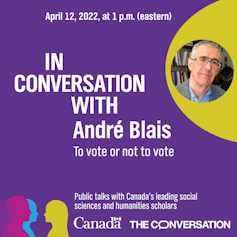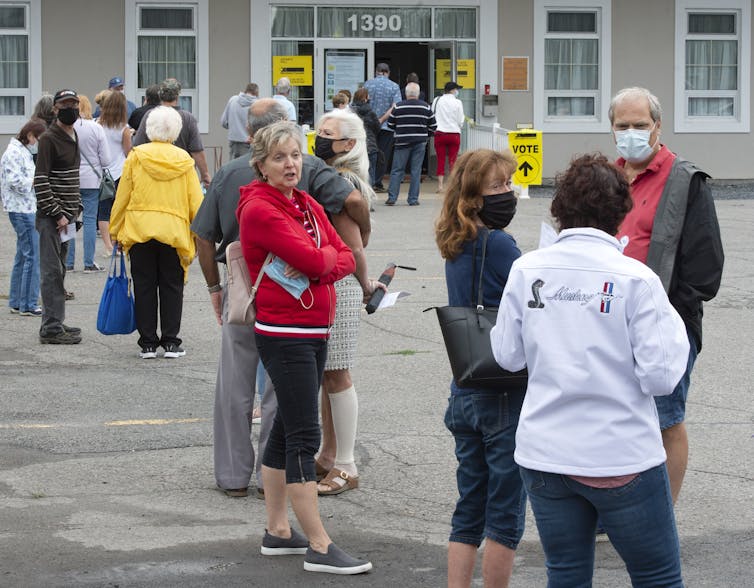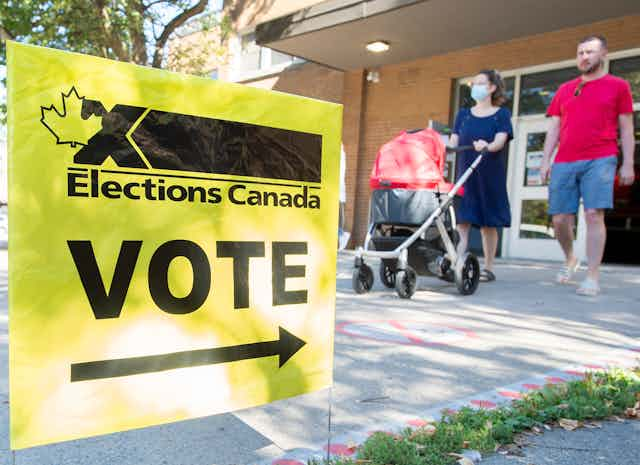Editor’s note: This story is part of series that also includes live interviews with some of Canada’s top social sciences and humanities academics.
As a political scientist, I see my role as answering — in the most rigorous way possible — questions that have been formulated as clearly as possible. One of the questions to which I have devoted the most time and effort in my nearly 50-year career is this: why do some people vote in elections and others don’t?
It’s the kind of question I love — a straight-forward one, about simple citizen behaviour. It appeals to my populist side. I’m always curious to understand what motivates people around me to make the kind of small decisions that speak volumes about who they are and what they are passionate about.
Hundreds of factors affect the decision to vote or abstain from voting during an election and these vary from voter to voter. The researcher’s goal is not to create an exhaustive inventory of all these factors. Rather, it is to systematically examine certain hypotheses about them.
A moral duty
In 2000, I wrote “To Vote or Not to Vote? The Merits and Limits of Rational Choice Theory”. Rational choice theory, which was developed by economists, was popular in political science at the time and was being used to explain everything from the legislators’ to voters’ behaviour.

In the case of voters, the theory was paradoxical. The “rational” voter realizes that in an election with millions of voters, the probability that his or her vote will change the outcome is infinitesimally small. In sum, the anticipated gain is minimal and most likely greater than the anticipated cost, i.e. the time spent deciding who to vote for and getting to the polls.
From this point of view, abstention seems to be the rational option. However, we see that most people do decide to vote, at least in national elections (the average turnout is now around 65 to 70 per cent). The facts seem to contradict the theory.
So I spent a few years reading and re-reading the research on voter turnout and conducting new studies of all kinds. These were mostly surveys, which remain the preferred instrument for understanding individual behaviour, but I also analyzed election results, conducted semi-structured interviews and even did an experiment to see how students react when presented with rational choice theory.
My conclusion was that when it comes to understanding voting behaviour, rational choice theory is not very useful. When deciding whether to vote or not, most people do not do a cost/benefit analysis. In fact, many people vote in an election primarily because they feel it is a moral duty to do so. Ethical considerations outweigh “rational” ones.
I would add, however, that some voters are sensitive to how much time it takes to vote, and that turnout is somewhat higher when the outcome of the election is uncertain. So rational considerations do come into play somewhat. Rational choice theory should not be rejected entirely, even if its contribution is limited.

A question of motivation
More recently, I wrote with a former student of mine “The Motivation to Vote: Explaining Electoral Participation”. The thesis is clear and simple: the decision to vote or not is above all a matter of motivation.
If I am interested in politics, it is more or less self-evident that I will want to vote in an election. In the same perspective, if I am not interested in politics, the “normal” thing to do is…nothing, i.e. not vote. Unless, of course, I believe that voting is not only a right but also a civic duty, in which case I would feel guilty for not voting.
In the book we show that interest in politics and a sense of duty are the two attitudes that most strongly correlate with the decision to vote or not. We then refer to research showing that these two attitudes are very stable and change little after the age of 20. Ultimately, values acquired early in life, one’s taste (or not) for politics and one’s conception of civic duties in a society are what most influence the decision to vote or not.
Habit and resources
Our work questions the validity of influential theories of voter turnout.
One of these theories is that people vote or abstain out of habit. We show that this explanation is not convincing. It is true that there is stability in behaviour about voting; a person who votes (or abstains) in one election is likely to do the same in the next.
But if it were a habit, one would expect to find that the values (such as interest in politics) that influence participation have a weaker impact on older people (who are more habitual and therefore less influenced by their values). The data show that this is not the case. The determinants of voting are basically the same for the young and the old. So the habit hypothesis is invalidated.
Our interpretation also casts doubt on another influential interpretation, that of resources. It is often argued that poorer and less educated people vote the least and that this is essentially because they have fewer political resources. While it is true that voter turnout is correlated with education and income, it should also be noted that this correlation is not very strong.
Moreover, it is far from clear that this is explained by a lack of resources, since the vast majority of citizens find it easy to vote. Resource theory is useful for explaining more demanding modes of participation, but it does not really apply to voting.
Some of my detractors will say that I take great pleasure in refuting popular explanations. There may be some truth to that. My motto is “Not Convinced,” as my students kindly reminded me at a conference in my honour. But isn’t the role of the researcher to subject both scientific theories and common sense to rigorous scrutiny, starting with healthy skepticism?


